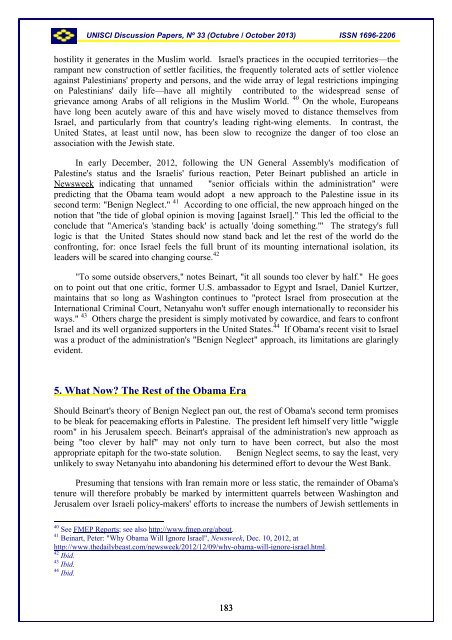UNISCI - Universidad Complutense de Madrid
UNISCI - Universidad Complutense de Madrid
UNISCI - Universidad Complutense de Madrid
You also want an ePaper? Increase the reach of your titles
YUMPU automatically turns print PDFs into web optimized ePapers that Google loves.
<strong>UNISCI</strong> Discussion Papers, Nº 33 (Octubre / October 2013) ISSN 1696-2206hostility it generates in the Muslim world. Israel's practices in the occupied territories—therampant new construction of settler facilities, the frequently tolerated acts of settler violenceagainst Palestinians' property and persons, and the wi<strong>de</strong> array of legal restrictions impingingon Palestinians' daily life—have all mightily contributed to the wi<strong>de</strong>spread sense ofgrievance among Arabs of all religions in the Muslim World. 40 On the whole, Europeanshave long been acutely aware of this and have wisely moved to distance themselves fromIsrael, and particularly from that country's leading right-wing elements. In contrast, theUnited States, at least until now, has been slow to recognize the danger of too close anassociation with the Jewish state.In early December, 2012, following the UN General Assembly's modification ofPalestine's status and the Israelis' furious reaction, Peter Beinart published an article inNewsweek indicating that unnamed "senior officials within the administration" werepredicting that the Obama team would adopt a new approach to the Palestine issue in itssecond term: "Benign Neglect." 41 According to one official, the new approach hinged on thenotion that "the ti<strong>de</strong> of global opinion is moving [against Israel]." This led the official to theconclu<strong>de</strong> that "America's 'standing back' is actually 'doing something.'" The strategy's fulllogic is that the United States should now stand back and let the rest of the world do theconfronting, for: once Israel feels the full brunt of its mounting international isolation, itslea<strong>de</strong>rs will be scared into changing course. 42"To some outsi<strong>de</strong> observers," notes Beinart, "it all sounds too clever by half." He goeson to point out that one critic, former U.S. ambassador to Egypt and Israel, Daniel Kurtzer,maintains that so long as Washington continues to "protect Israel from prosecution at theInternational Criminal Court, Netanyahu won't suffer enough internationally to reconsi<strong>de</strong>r hisways." 43 Others charge the presi<strong>de</strong>nt is simply motivated by cowardice, and fears to confrontIsrael and its well organized supporters in the United States. 44 If Obama's recent visit to Israelwas a product of the administration's "Benign Neglect" approach, its limitations are glaringlyevi<strong>de</strong>nt.5. What Now? The Rest of the Obama EraShould Beinart's theory of Benign Neglect pan out, the rest of Obama's second term promisesto be bleak for peacemaking efforts in Palestine. The presi<strong>de</strong>nt left himself very little "wiggleroom" in his Jerusalem speech. Beinart's appraisal of the administration's new approach asbeing "too clever by half" may not only turn to have been correct, but also the mostappropriate epitaph for the two-state solution. Benign Neglect seems, to say the least, veryunlikely to sway Netanyahu into abandoning his <strong>de</strong>termined effort to <strong>de</strong>vour the West Bank.Presuming that tensions with Iran remain more or less static, the remain<strong>de</strong>r of Obama'stenure will therefore probably be marked by intermittent quarrels between Washington andJerusalem over Israeli policy-makers' efforts to increase the numbers of Jewish settlements in40 See FMEP Reports; see also http://www.fmep.org/about.41 Beinart, Peter: "Why Obama Will Ignore Israel", Newsweek, Dec. 10, 2012, athttp://www.thedailybeast.com/newsweek/2012/12/09/why-obama-will-ignore-israel.html.42 Ibid.43 Ibid.44 Ibid.183
















